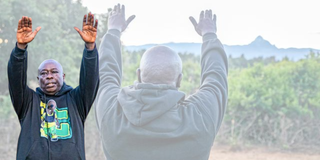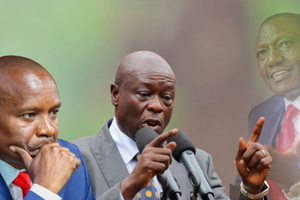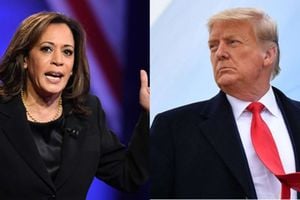
The sun has set on the impeached Deputy President Geoffrey Rigathi Gachagua’s brief political career at the helm of power — although, certainly, not his influence.
The sun has set on the impeached Deputy President Geoffrey Rigathi Gachagua’s brief political career at the helm of power — although, certainly, not his influence. To its credit, the country enters the annals of history as the first-ever African polity to successfully impeach a vice/deputy president through its democratic institutions. But the impeachment process has tested the mettle of Kenya’s democracy in a visible and public way.
Gachagua’s meteoric rise and fall — likened to the fabled Simon Makonde who was just born, named, married, and then fell ill and died having accomplished nothing worthwhile in his legendary life — has turned a sharp spotlight on the quality of our democracy. Besides ending Gachagua’s tenure at the apex of power, it is still too early to fathom what the coming to power of the law professor, Abraham Kithure Kindiki (52), as the third Deputy President under the 2010 Constitution, means for Kenya’s nascent democracy.
Arguably, Kindiki represents an endangered species in democracies across the world. His intellectual and political career fits Plato’s description of a ‘philosopher-king’ who blends political skill with philosophical knowledge — very much like President Mwai Kibaki.
Notably, the swearing-in of Gachagua on September 13, 2022 and his impeachment on October 8, 2024 have unfolded against the backdrop of the protracted race for the 47th President of the United States, which has witnessed a surprising comeback of President Donald Trump who is now head-to-head with Vice-President Kamala Harris in the most recent polls on the 2024 Presidential election. Gachagua’s political demise and Trump’s possible return beg the question: Why do democracies elect demagogues — a genre of populist leaders who thrive on prejudices, false promises, and charisma to manipulate voters and win power? Or inversely posed, why are enlightened leaders so endangered in Kenya?
Infectious rhetoric
Democracy in Kenya, as elsewhere, is a good idea — a mirage and an infectious rhetoric. Voters are likely to elect to power demagogues with the gift of the gab, especially in our post-truth age where a lie travels halfway around the world while the truth is putting on its shoes. But what does democracy really mean beyond the rhetoric, jingoisms, cultural and ideological biases? Debate on democracy is shrouded in controversy. As a Kenyan who born and weaned under the stifling one-party tyranny, I am inclined to agree with Winston Churchill that “democracy is the worst form of government except all those other forms that have been tried from time to time.” In Kenya, democracy has returned power back to the hands of the people.
Kenyans are not new to democracy. Like the Ancient Greeks, they have played their role in direct democracy in their villages, manyattas and hamlets. It was Mwalimu Julius Nyerere who recalled nostalgically how in Africa’s village democracies the elders sat under the big tree and talked and talked until they agree. Today, Kenya has a representative system of democracy in which elected officials at the county and national tiers of government make decisions on behalf of the people. During the 2022 elections, President Uhuru Kenyatta’s Jubilee Party tried to court ‘village democracy’ as a hybrid model during nominations, stoking disaffection and defeat. Both direct and indirect systems of democracy are prone to manipulation by self-seekers who appeal to parochial sensibilities, prejudices and fears of ordinary people to win or stay in power.
For over a quarter of a century between 1989 and 2016, democracy experienced what Samuel Huntington touted as the ‘third wave’ of democracy. Kenya, like many ethnically-divided societies was won to the ‘democratic peace theory’ — the idea that democracies do not go to war with one another — which was the cornerstone of the foreign policy of the United States and propelled pro-democracy activism globally. But democracy has been on the back foot since the coming of the Donald Trump phenomenon — the massive election of populists, jokers, cranks, weak men and charlatans with money and the gift of the gab. Whether democracy is innately good for the people is a toss-up for two reasons.
One reason is that democracy makes it difficult for those with knowledge to gain power. While democracies give citizens a say, majority rule without knowledge can lead to an equivalent of societal shipwreck. Voting — either directly or for representatives — requires a skill and wisdom that not every citizen has. The consequences of people voting without skill and full knowledge is like allowing anyone on board a ship during a stormy and dangerous sea voyage to make decisions rather than giving that power to well-trained captain. Its results on politics, economy, freedoms and even spirituality can be as dire — a societal shipwreck.
Monopolise power
The second reason is that democracies allow those without knowledge — and the interests of the people and the nation at heart — to gain and monopolise power. Due to its excessive freedom where everyone has a right to rule, democracy puts to power leaders without proper skills or morals. It allows all sorts of selfish people who care nothing for the people but are only motivated by their own personal desires to attain power. Elections are likened to a competition between a doctor and a sweet shop owner. The sweet shop owner, a demagogue who promises sweets and candies and accuses the doctor of giving bitter syrups to the people, poking holes on them and cutting their skin to take their blood, wins. In this context, democracies have swept tyrants, dictators and fascists like Adolf Hitler to power, eventually bursting the myth of ‘democratic peace.’ Democracy, after all, can elect those who take democracies to war.
Presently, the bar to be a Kenyan leader is too low. Compare this with countries like China or Singapore. For a leader to be among the top Seven in the governing Committee in China, they must have served two terms outside their home provinces as provincial governors or equivalent and govern 110 million people with clear distinction. Kenya needs to return to meritocracy where only the ablest and the best equipped should preside over public institutions. Ahead of 2027, the country must break the trap of “one-day-democracy” that gives power to the people only during the voting day, leaving them at the mercy of crooks, cranks and charlatans at the helm of crony capitalism for the next five years. Now with a doctor and a professor at the helm as President and Deputy President, respectively, Kenya has a rare chance to combine knowledge and power.
Prof Peter Kagwanja is the Chief Executive at the Africa Policy Institute and a former government adviser.










